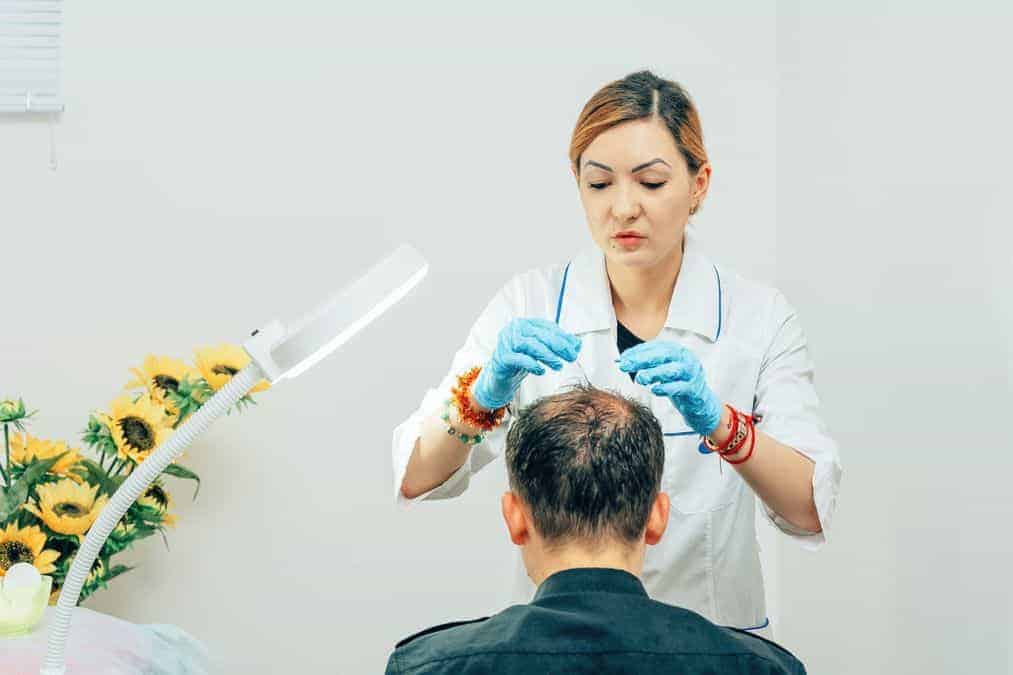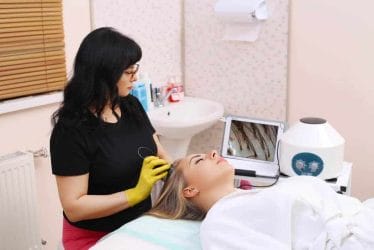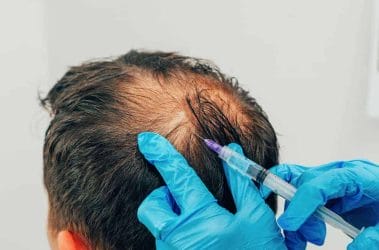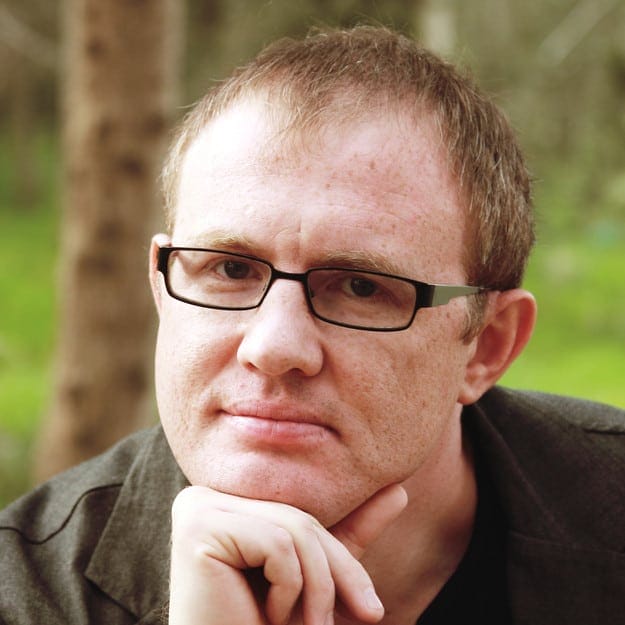
Trichologist – opinions, how he can help
Text updated on 07.05.2021
Beautiful, thick and above all healthy hair is one of the attributes of both female and male beauty. This is why you should take proper care of them, not forgetting about regular care of the scalp. Ignoring the basic rules results in almost immediate weakening of the hair structure, its fragility, breakability and eventually hair loss. Unfortunately, usually we are not able to identify the cause of such problems on our own and it will be necessary to visit a trychologist, a professional dealing with this subject, from whom hair have no secrets.
Contents
- 1 Trichologist – who is he and how to become one
- 2 What does a trychologist do?
- 3 Trichologist – causes of hair loss, which he counteracts
- 4 A trychologist – how does a visit in his consulting room look like
- 5 Trychologist – what professional treatments he offers
- 6 Folisin – a dietary supplement readily recommended by trichologists
Trichologist – who is he and how to become one
Before we describe in more detail who the trichologist is and what he does, we should say who he is not. First of all, he is not a doctor, because medical studies in our country do not include, at least for the moment, such a specialization. However, the fact that he does not have a medical diploma does not mean that it is not worth taking advantage of his knowledge in the field of hair diseases and hair care. One who wants to deal with this profession absolutely must have a degree in cosmetology, and then complete postgraduate studies and a number of specialized courses.
Of course, such issues are dealt with by virtually every dermatologist, so they can be called trichologists, and those who do not have a medical degree are called cosmetic trichologists. Differences are also visible in the treatment of diagnosed ailments, because only a doctor can assign pharmacological agents available on prescription.
What does a trychologist do?

Trichology is a relatively new field of science, which deals with ailments related to the scalp and hair. Its precursor is considered to be the British Professor Wheeler, who began to deal with it in the 70s of the last century, and it reached Poland only in the 90s. Year after year more and more clinics are opened, in which one can receive professional advice and effective help concerning mainly scalp disorders and the increasingly common problem of hair loss. The scope of activity of such specialist is really wide and what the trychologist deals with includes:
- ways to prevent hair loss, caused among others by telogenetic alopecia or as a result of progressive androgenic alopecia;
- treatment of diseases such as seborrheic dermatitis, psoriasis, atopic dermatitis;
- oily hair and scalp which may lead to dandruff;
- Any irritation, redness or inflammation of the scalp;
- Inflammation of the hair follicles caused for example by dihydrotestosterone, or DHT, a destructive type of testosterone.
Trichologist – causes of hair loss, which he counteracts
Despite such a wide range of activities, the trichologist deals primarily with the fight against the effects of alopecia, an ambiguous disease, which is sometimes very difficult to diagnose correctly. As we already know, there are many varieties of it, differing from each other in symptoms, course and causes that cause it, and most often specialists point to:
Genetic factors
Relatively common, responsible for, among others, the above mentioned androgenetic alopecia. It’s worth knowing that we do not inherit baldness from the older generation, but a tendency to excessive and usually too fast hair loss. So if your father or even grandfather said goodbye to their hair at a young age, we can expect it too.
Endocrine Disruptors
Hormonal imbalances have a negative effect on the overall health, which is immediately reflected in the appearance and condition of the hair. In women, they usually occur during the menopause and in men during the andropause, when the secretion of estrogen and testosterone respectively may be disturbed. The latter can also mutate into the aforementioned DHT, causing severe damage and, over time, death of hair follicles.
Improper hair care
A thing about which whole volumes have been written, also pointed out by trichologists as one of the main causes of baldness and scalp diseases. Trichological examination very often shows the effects of using improperly chosen shampoos or conditioners for hair, causing either dryness or, on the contrary, too much sebum and oily skin, which is also the cause of acne.
Brushing your hair too much or, in the case of long hair, tying it up tightly with a rubber band causes it to break off. Ladies should also limit the use of hair dryers and straighteners, which can damage hair irreparably.
A Diet Devoid of Nutrients
Hair, like the rest of the body, needs a lot of nutrients to live and stay healthy. Such deficiencies may cause almost immediate weakness and hair loss. That is why it is necessary to properly compose your daily diet, which absolutely must include the following substances:
- Vitamin A, which regulates the sebum secretion;
- B vitamins, especially B3 (niacin), which improves scalp circulation, B5 (pantothenic acid), which is involved in the synthesis of keratin, B7 (biotin), which ensures a strong hair shaft, B9 (folic acid), which stops greying and stimulates the formation of new cells, B12 (cobalamin), which gives the hair protection against external factors
- vitamin C, a powerful antioxidant that removes free radicals from the body and conditions the correct synthesis of collagen;
- Vitamin E, which takes care, among other things, of nourishment and oxygenation of the skin and hydration of hair along its entire length;
- minerals zinc, selenium, silicon, sulphur and copper.
Other illnesses and medications taken
The trichologist must also be able to recognize if the hair loss is due to other illnesses that the patient is often not even aware of. It may be an effect of stress, nervous tension manifesting itself, among others, as baldness, but just as often it is a systemic disease affecting the whole body. People suffering from thyroid diseases, hyperthyroidism, hypothyroidism and Hashimoto, should also go to a trychologist, if they notice that they lose more hair than the prescribed norm of 100 – 150 a day. It is also worth to watch out for medications taken, in case of some of them the side effect is hair loss, usually ceasing after discontinuation of the drug or other therapeutic preparation.
A trychologist – how does a visit in his consulting room look like
Now that we know who a trychologist is and what specifically he deals with, it is time to find out how a visit at his office will look like. First of all, there is nothing to fear, almost all specialized examinations performed are practically painless, and a professional office offers:
- trichoscopy, a method of hair examination performed with the help of a videodermatoscope, a device equipped with a sensitive camera, with the help of which several photos of the skin are taken at high, even 75 times and higher magnification, the frontal, occipital and temporal parts are photographed, and the photos are the basis for determining the health of the scalp and hair. They also make it possible to diagnose a specific type of disease, whether plaque, telogen or androgenic;
- trichogram, a slightly more invasive examination, consisting of collection of 100-150 hairs from the bald spot and their detailed analysis under a microscope at very high magnification. The trichogram must be preceded by a blood test to detect possible deficiencies of the above described nutrients, vitamins and minerals essential for hair health. The hair must not be washed for 2 – 3 days and must not be treated with other hair care cosmetics, foams, conditioners or gels. The analysis of hair appearance under the microscope also allows to determine with great accuracy the type of baldness and its causes and thus choose the right way of treatment.
Trychologist – what professional treatments he offers

A visit to a trichologist’s office is not only a precise examination, but also numerous treatments performed on the basis of the results obtained. All of them are aimed firstly at stopping the progressive baldness, restoring full health to the scalp and then stimulating follicles and bulbs to allow the growth of new, stronger hair. Some of them are non-invasive, others invasive, but they all have one thing in common, high effectiveness, and that’s why every salon offers primarily two trichology treatments:
Mesotherapy of the scalp
A treatment involving injection into the scalp, usually with a special device, carefully selected substances to strengthen weakened hair follicles and thus stop hair loss. The composition of such a medicinal cocktail includes, among others:
- platelet rich plasma obtained from the patient’s blood;
- cells obtained from the patient’s adipose tissue;
- coenzyme Q10;
- vitamin and mineral sets;
- amino acids conditioning fast hair growth.
Carboxytherapy of the scalp
Another effective method that allows to control baldness as well as many diseases of the scalp that may lead to it. It also involves injecting the scalp, but this time with a safe dose of carbon dioxide. The treatment causes an almost immediate dilation of blood vessel walls, which results in better blood flow, oxygenation and nourishment of the skin on your head. Its regeneration is also faster, collagen production increases and new, stronger and thicker hair grows faster.
Folisin – a dietary supplement readily recommended by trichologists
Apart from performing the above mentioned procedures, trichologists recommend their patients dietary supplements which support hair on a daily basis. They are full of ingredients that promote their health, protect against receding baldness, moisturize and nourish hair from the roots to the very ends. One of the most recommended are Folisin tablets, with an exceptionally rich composition, containing everything our hair needs to grow strong and not fall out. They are composed only of natural ingredients, so they are completely safe and do not cause any side effects.

Sources:
- https://www.healthline.com/health/hair-loss
- https://www.healthline.com/health/mesotherapy
- https://www.healthline.com/health/carboxytherapy



